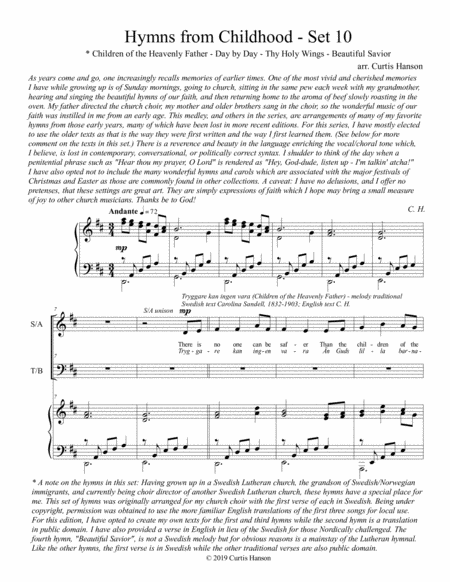Choral Choir (SATB) - Level 3 - Digital Download SKU: A0.719738 Composed by Various. Arranged by Curtis Hanson. Sacred. Octavo. 13 pages. Curtis Hanson #4573123. Published by Curtis Hanson (A0.719738). As years come and go, one increasingly recalls memories of earlier times. One of the most vivid and cherished memories I have while growing up is of Sunday mornings, going to church, sitting in the same pew each week with my grandmother, hearing and singing the beautiful hymns of our faith, and then returning home to the aroma of beef slowly roasting in the oven. My father directed the church choir, my mother and older brothers sang in the choir, so the wonderful music of our faith was instilled in me from an early age. This medley, and others in the series, are arrangements of many of my favorite hymns from those early years, many of which have been lost in more recent editions. For this series, I have mostly elected to use the older texts as that is the way they were first written and the way I first learned them. (See below for more comment on the texts in this set.) There is a reverence and beauty in the language enriching the vocal/choral tone which, I believe, is lost in contemporary, conversational, or politically correct syntax. I shudder to think of the day when a penitential phrase such as Hear thou my prayer, O Lord is rendered as Hey, God-dude, listen up - I'm talkin' atcha! I have also opted not to include the many wonderful hymns and carols which are associated with the major festivals of Christmas and Easter as those are commonly found in other collections. A caveat: I have no delusions, and I offer no pretenses, that these settings are great art. They are simply expressions of faith which I hope may bring a small measure of joy to other church musicians. The hymns in this set are Children of the Heavenly Father, Day by Day, Thy Holy Wings, and Beautiful Savior. A note on the texts in this set: Having grown up in a Swedish Lutheran church, the grandson of Swedish/Norwegian immigrants, and currently being choir director of another Swedish Lutheran church, these hymns have a special place for me. This set was originally arranged for my church choir with the first verse of each in Swedish. Being under copyright, permission was obtained to use the more familiar English translations of the first three songs for local use. For this edition, I have opted to create my own texts for the first and third hymns while the second is a translation in public domain. I have also provided a verse in English in lieu of the Swedish for those Nordically challenged. The fourth hymn is not a Swedish melody but for obvious reasons is a mainstay of the Lutheran hymnal. Like the other hymns, the first verse is in Swedish while the other traditional verses are also public domain.
